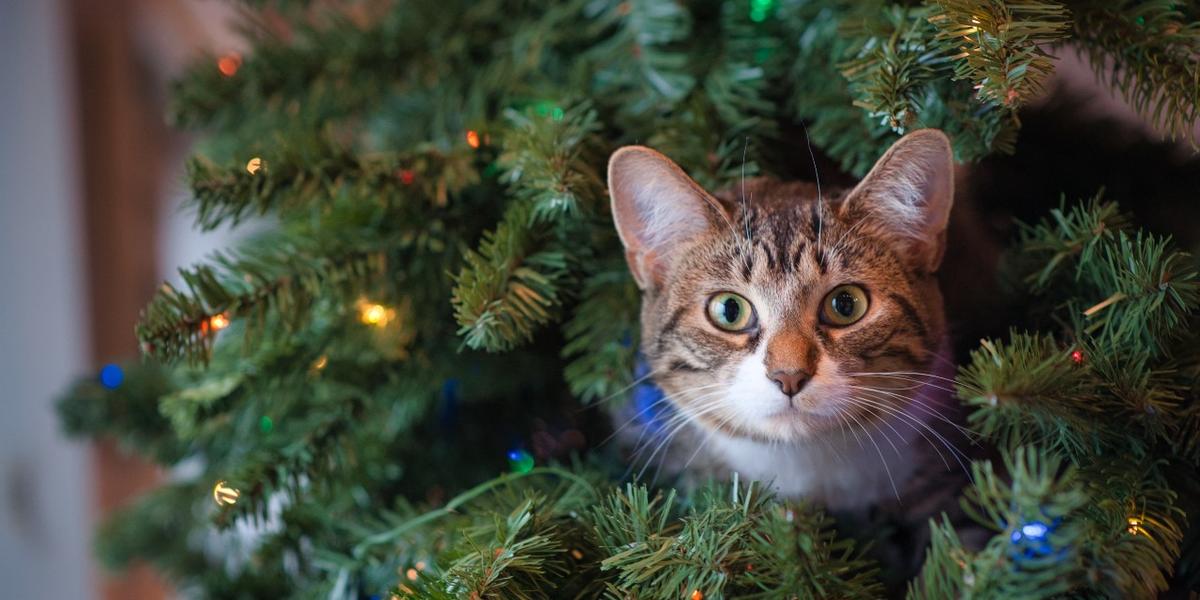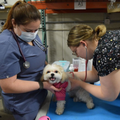The holidays traditionally create a flurry of activity in stores and in homes as people prepare to celebrate with family and friends. As much cheer as new toys, baked goods, and decorations bring to the season, they also can pose a danger to pets if consumed.
No matter the time of year, pets have a habit of poking their noses where they shouldn’t, and that can result in them eating items that are potentially toxic. The holiday season brings pets in contact with unsuspecting hazards and leaves many owners turning to veterinary experts for help, including those at the Pet Poison Helpline, which receives more than 80,000 calls per year regarding potential pet poisonings.
The Pet Poison Helpline (PPH) is a 24-hour animal poison control service available throughout the U.S., Canada, and the Caribbean for pet owners and veterinary professionals who require assistance with treating a potentially poisoned pet.
“Any pet owner and any veterinarian can call us any time if they are concerned a pet got into something problematic,” says Ahna Brutlag, ’06 DVM, MS, DABT, DABVT, director of veterinary services for PPH and an adjunct faculty member at the University of Minnesota College of Veterinary Medicine (CVM). “It’s common for us to get calls from someone that came home and found that their dog chewed into a bag of chocolate chips or their cat ate some of their new plant.”
The holidays mark a busy time for the helpline. The average home already contains potential hazards, but the holiday season brings decorations, gifts, foods, and guests that all pose potential harm to pets if not care isn’t taken.
Dangerous decorations
Cats and dogs are often curious when it comes to new additions to their environment, and the holidays bring many new items to investigate. Decorative plants are one type of item that pet owners are warned about year after year. Floral bouquets, centerpieces, and potted plants make their appearances during the holiday season, and none is more feared than the poinsettia. However, it’s a reputation that is overhyped, Brutlag says, and the plant isn't nearly as toxic as is often portrayed.
Plants that are highly toxic to pets—specifically cats—include members of the lily family, according to Lynn Hovda,’84 RPH, DVM, MS, DACVIM, director of veterinary services for Poison Pet Helpline and an adjunct faculty member at CVM. These can include daylilies, tiger lilies, and Easter lilies. Exposure to any part of the plant—even the water in its vase—may result in acute kidney failure in cats.
They’re not the only foliage to watch out for when decorating a home. Some evergreens from the yew family are poisonous to large and small animals but are often used in garland and wreath decorations. It’s best to keep any holiday botanicals away from pets.
And don’t forget about what goes on the tree. Hovda says poisonings that result from pets eating ornaments constructed from salt dough spike during this time of year. Other potential sources of salt include table salt, sidewalk de-icer, and paintballs. Salt poisoning can cause a host of symptoms from vomiting to tremors and can be deadly in severe cases.
Guard the gifts
When it comes to gifts, there are many that can pose a hazard to pets. This includes anything with batteries or small parts—they can cause injuries if swallowed—and trendy gifts with food components, such as brew-your-own beer kits. Hops, a dried flower used in brewing, are toxic to dogs.
Online holiday shopping means thousands of gifts are showing up on doorsteps daily. If pets have access to delivered packages on steps, in porches, or in other parts of the home, there’s a chance they may try to chew through the box to get to what’s inside.
“If it’s something in it that smells good to them, they have a lot of incentive to chew through that package, so it’s important to be mindful of that,” Brutlag says.
To prevent any mishaps, pet owners should have their packages delivered or stored in a location that is not accessible to pets.
Food for thought
Holiday meals also are a source of potentially toxic foods. Most people know that pets shouldn’t be given chocolate, but there are other dangerous foods that may not be as widely recognized. Owners should avoid feeding their pets grapes, raisins, and currants. These fruits can cause kidney failure in dogs, so limit the fruitcake to humans only.
If small children are in the home, Brutlag warns that adults should supervise kids to ensure they are not feeding potentially harmful food items to pets. Pet owners also should keep an eye on the trash can. Another common call PPH receives is for dogs or cats that have rummaged through the trash and have eaten potentially harmful food waste such as corn cobs, discarded turkey trussings, and bones, which pose choking hazards and can result in gastrointestinal blockages if swallowed.
Other common holiday foods that are harmful to pets include:
- Fatty foods such as butter, bacon, fatty meat drippings, gravies and meat scraps. Ingesting these items could lead to a pet developing pancreatitis, an inflammation of the pancreas. Symptoms include vomiting, diarrhea, loss of appetite and abdominal pain.
- Turkey brine, a salt-saturated solution, can cause salt poisoning in cats and dogs if ingested.
- Nuts are high in fat and can result in pancreatitis if eaten. Macadamia nuts in particular pose a serious threat and can cause vomiting, diarrhea, or an inability to rise or walk normally if ingested.
Visitor hazards
While health officials warn people to stay home for the holidays this year, the reality is millions are expected to travel and visit family. Whether hosting or visiting, it’s important to remind guests to keep potentially toxic items away from pets. This includes always making sure to hang up coats and bags.
“One thing that we find is that when people go over to other people’s houses—granted this year will be different but there will probably still be some visiting—is that people need to hang up their backpacks and their purses,” Brutlag says. “Pets, especially dogs, can go through someone’s purse and take out items like medications or chewing gum.”
Ingesting human medication sounds like an obvious danger to pets, but even sugar-free gum can be harmful to their health. A key ingredient in the gum, xylitol, can cause dangerous blood sugar drops in dogs and cats.
During the holidays—or any time of the year—it’s important for pet owners to identify possible hazards and find ways to keep their pet from accessing them.
“The best way to prevent potential poisonings is to pet-proof your home just like you would child-proof it if you have children,” Hovda says. “And you should give a lot of thought about what you’re bringing into your home.”
If you suspect your pet may have ingested something that is potentially toxic, you can call the Pet Poison Helpline at 855-764-7661 for assistance.




